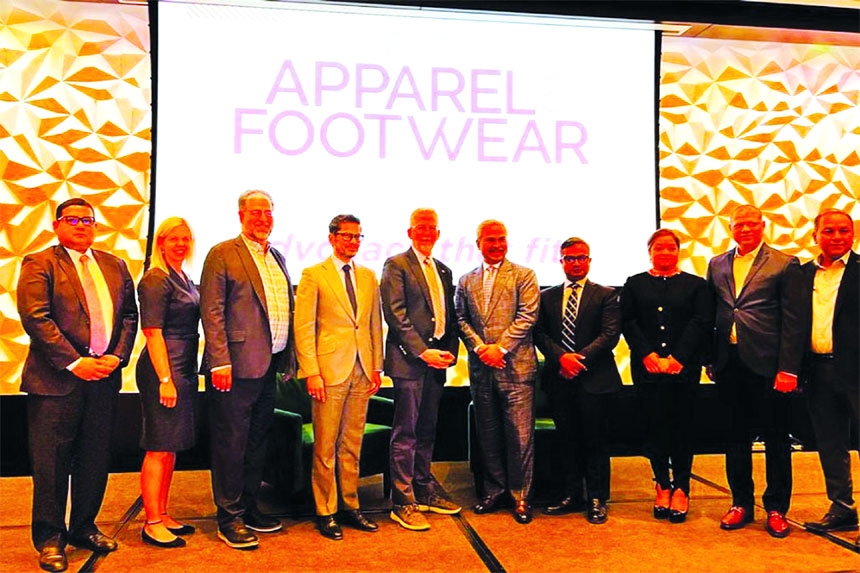
Business Desk :
The American Apparel & Footwear Association (AAFA) has signed a Memorandum of Understanding (MoU) with the Bangladesh Garment Manufacturers and Exporters Association (BGMEA) to support Bangladesh in promoting its RMG trade interests in the US market.
The two associations will explore opportunities and work together to increase trade access for Bangladesh, improve purchasing practices, build on the great work already done by the Bangladeshi industry on sustainability, and expand the strong partnership between the US and Bangladeshi industry.
AAFA President and CEO Steve Lamar and BGMEA President Faruque Hassan shared the pen in Washington, DC during the annual AAFA Executive Summit which convenes the AAFA Board of Directors and industry leadership, said the BGMEA on Saturday.
BGMEA Vice President Miran Ali, Directors Abdullah Hil Rakib and Barrister Vidiya Amrit Khan, Chairman of BGMEA Standing Committee on Foreign Mission Cell Shams Mahmud and Director of Mahmud Group Gazi Mahbubul Aalm were also present at the signing ceremony, reports UNB.
“Together, we aim to unlock the potential of Bangladesh’s RMG sector by enhancing competiveness through building capacities and embracing innovations and technologies, and facilitating trade access to the US market. We also aim to develop joint programs that train workers and mid-and top-management, explore new CSR initiatives to support the well-being of the workers and communities, and more,” said Faruque Hassan.
AAFA’s comprehensive work ensures the continued success and growth of the global apparel and footwear industry, its suppliers, and its customers. With this in mind, agreements with strategic partners around the world help reduce trade barriers, encourage sharing of ESG best practices, and promote innovation on behalf of our members, said AAFA President and CEO Steve Lamar.
“Today’s collaboration marks increased capacity building to support joint practices and trainings to advance supply chain sustainability, expand trade opportunities, improve the buyer-supplier partnership.”
As per the understanding, the AAFA will support Bangladesh in promoting its trade interests in the US market, especially advocating for the withdrawal of GSP suspension to recognize the progress made in the local industry in the area of workplace safety, workers well-being and environmental sustainability.
AAFA, a trusted public policy and political voice of the apparel and footwear industry, will also work closely with BGMEA to advocate for improved trade preferences and programs between the United States and Bangladesh.
AAFA, which represents more than 1,000 world-famous name brands, retailers, and manufacturers, along with BGMEA will pursue to improve the partnership between buyers and suppliers through responsible purchasing practices.
They will also work collaboratively on capacity building to cut time and cost, to make the supply chain more sustainable, via developing joint programs to train workers and mid/top management, and a special collaboration with BGMEA Center for Innovation, Efficiency & OSH, and a collaborative arrangement between the Parties and BGMEA University of Fashion & Technology (BUFT).
The two associations will inspire buyers-supplier collaboration to upscale product development and innovation capability to explore untapped segments of the export market, via joint research, coaching programmes, sharing of knowledge and information like fashion trend analysis and forecasting, matchmaking events, media campaigns, etc.
They will also work on creating joint scoping missions to explore bilateral investment opportunities, particularly in backward linkage textile industries in Bangladesh, especially in the non-cotton segment.
AAFA and BGMEA will collaborate to deepen discussion towards a unified code of conduct, or unified approach, like symphonization, for social and environmental audits in manufacturing facilities, via setting up of a Joint Committee with clear terms of engagement.
They will also set up a corporate alliance on CSR initiatives to ensure well-being of the workers and communities.

